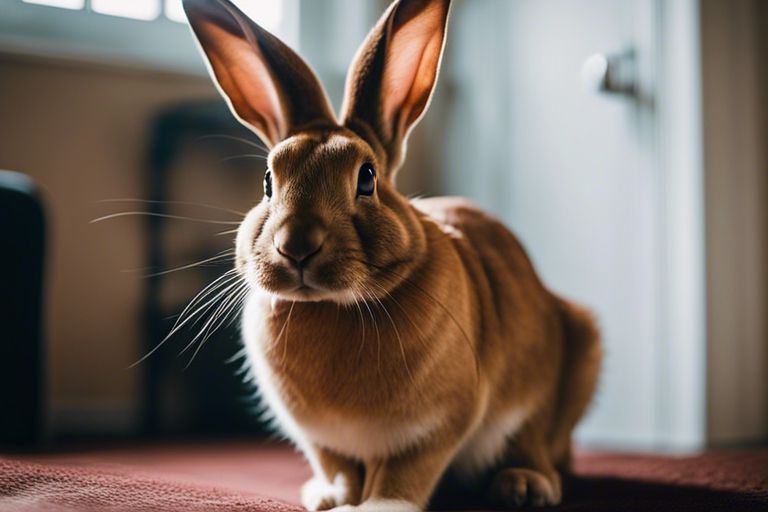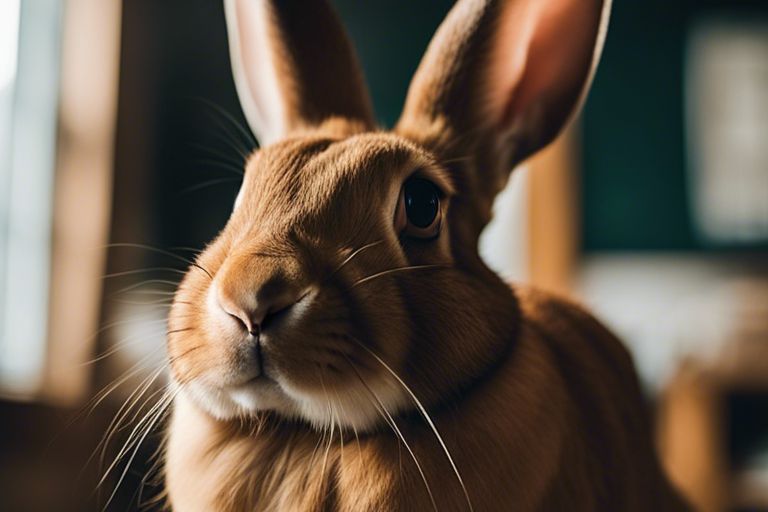Have you noticed unusual behaviors in your Flemish Giant rabbit lately? As a responsible pet owner, it’s important to pay attention to the signs of stress and unhappiness in your beloved pet. While these gentle giants are generally laid-back and easygoing, they can experience anxiety and distress under certain circumstances. In this blog post, we will discuss the warning signs that indicate your Flemish Giant may be feeling stressed or unhappy, so that you can address the issue promptly and effectively.
Key Takeaways:
- Changes in behavior: Look for signs of increased aggression, timidity, or withdrawal from normal activities.
- Changes in eating habits: An unhappy Flemish Giant may eat less or refuse food altogether.
- Physical symptoms: Watch for signs of excessive grooming, overgrown nails, or other physical indicators of stress.
- Environmental factors: Consider if changes in their living space or routine could be causing stress or unhappiness.
- Seek professional help: If you suspect your Flemish Giant is stressed or unhappy, consult with a veterinarian to address any potential health concerns.
Behavioral Indicators
One of the most crucial ways to tell if your Flemish Giant is stressed or unhappy is through their behavior. Keep an eye out for any unusual actions or changes in their normal habits, as these can often be strong indicators of their emotional well-being.
Temperament Changes
If your usually calm and easy-going Flemish Giant suddenly becomes aggressive or irritable, this could be a sign of stress or unhappiness. You may notice them thumping their hind legs, growling, or even biting when they are normally docile. These are important signs that something is wrong and should not be ignored.
Disrupted Socialization Patterns
Another behavioral indicator to watch for is disrupted socialization patterns. If your Flemish Giant starts hiding or isolating themselves from you, other pets, or their usual surroundings, it could be a sign of distress. Additionally, if they stop engaging in activities they used to enjoy, such as playing or exploring, this could also indicate unhappiness. These changes in behavior are important to pay attention to and address promptly.
By paying attention to these key behavioral indicators, you can begin to understand and address your Flemish Giant’s stress and unhappiness. Remember that changes in behavior are often the first signs of potential issues, and it is important to address them promptly. In the next section, we will discuss physical indicators to watch for in your Flemish Giant.
Physical Health Signs
Assuming you suspect that your Flemish Giant rabbit may be stressed or unhappy, it’s important to look for physical health signs that could indicate underlying issues. Paying attention to your rabbit’s eating habits, coat condition, and overall physical appearance can provide valuable insight into their well-being.
Eating Habits and Nutrition
One of the first things to look for when assessing your Flemish Giant’s physical health is their eating habits. A sudden decrease in appetite or a significant change in their diet could indicate stress or illness. Additionally, paying attention to the quality and variety of your rabbit’s food is crucial. Ensure that you are providing a well-balanced diet rich in fiber, fresh vegetables, and Timothy hay. Not meeting their nutritional needs can lead to health issues and impact their overall well-being.
Grooming and Coat Condition
Another important aspect of your Flemish Giant’s physical health is their grooming and coat condition. A happy and healthy rabbit will have a shiny, soft coat and will spend time grooming themselves regularly. If you notice a dull, matted, or unkempt coat, it could be a sign of stress or underlying health problems. Additionally, keeping an eye out for any skin irritations, abnormalities, or parasites is essential for maintaining your rabbit’s overall well-being.
By paying close attention to your Flemish Giant’s physical health signs, such as their eating habits, nutrition, grooming, and coat condition, you can gain valuable insights into their well-being. Remember, your rabbit’s health is in your hands, and taking proactive steps to address any physical health concerns can lead to a happier, healthier pet.
Environmental and Lifestyle Factors
Your Flemish Giant rabbit’s environment and lifestyle can have a significant impact on their stress levels and overall happiness. Here are some environmental and lifestyle factors to consider:
- Living Space: Do you provide enough space for your rabbit to move around and stretch their legs? A cramped living space can cause stress and lead to unhappiness.
- Noise Levels: Are there loud, sudden noises in your rabbit’s environment? Rabbits are sensitive to sound and can become stressed if there is constant loud noise around them.
- Temperature: Is the temperature in your rabbit’s living space too hot or too cold? Extreme temperatures can be very stressful for rabbits.
This resource can provide more insights into the causes and symptoms of stress in rabbits.
Habitat and Enrichment Necessities
Providing a suitable habitat and sufficient enrichment for your Flemish Giant is essential for their well-being. Ensuring they have a spacious, comfortable living space with hiding spots and toys can help reduce stress and keep them mentally stimulated. Proper bedding and litter material are crucial for maintaining a clean and hygienic living area for your rabbit.
The Role of Exercise and Training
Regular exercise is crucial for keeping your Flemish Giant rabbit healthy and happy. Providing opportunities for them to run, hop, and explore can help alleviate stress and prevent behavioral issues. Additionally, positive reinforcement training can strengthen the bond between you and your rabbit, promoting mental stimulation and overall well-being.
Support and Remediation Strategies
Now that you are aware of the warning signs of a stressed or unhappy Flemish Giant, it’s important to understand how to support and remediate these issues. Addressing your rabbit’s well-being is crucial, and there are several strategies you can implement to help alleviate their stress or unhappiness.
Veterinary Care and Check-ups
Regular veterinary care is essential for the overall health and well-being of your Flemish Giant. Schedule annual check-ups to ensure that your rabbit is in good health and to address any potential concerns before they escalate. Remember, early detection and treatment are key to ensuring your pet’s well-being.
Positive Reinforcement and Alternative Therapies
Creating a positive and enriching environment for your Flemish Giant can help alleviate stress and unhappiness. Utilize positive reinforcement techniques to reward good behavior and provide mental stimulation through enriching activities. Additionally, consider alternative therapies such as aromatherapy or music therapy to help relax and comfort your rabbit.
By incorporating these support and remediation strategies into your Flemish Giant’s care routine, you can create a happier and healthier environment for your beloved pet. Remember, your rabbit’s well-being is in your hands, and taking proactive steps to address their needs is essential. With the right approach, you can make a significant difference in their overall happiness and quality of life.

Conclusion
From above, it is important to pay close attention to the warning signs of stress or unhappiness in your Flemish Giant. By monitoring their behavior, body language, and physical condition, you can better understand their needs and avoid potential health issues. Remember to seek professional guidance if you notice any concerning changes in your rabbit’s behavior or well-being. By being proactive and observant, you can ensure that your Flemish Giant remains healthy and happy.
FAQ
Q: What are the warning signs of a stressed or unhappy Flemish Giant?
A: There are several warning signs that can indicate a stressed or unhappy Flemish Giant. These include decreased appetite, unusual aggression or withdrawal, excessive shedding, changes in bathroom habits, and physical symptoms such as overgrown teeth or fur loss. It is important to monitor your rabbit’s behavior and physical appearance for any of these signs.
Q: How can I help reduce stress and unhappiness in my Flemish Giant?
A: To help reduce stress and unhappiness in your Flemish Giant, make sure they have a spacious and clean environment, access to fresh hay and water, and opportunities for exercise and mental stimulation. Additionally, spending quality time with your rabbit, providing them with toys and safe hiding spots, and ensuring they have a consistent routine can all contribute to their overall well-being.
Q: When should I seek professional help for my stressed or unhappy Flemish Giant?
A: If you notice persistent or severe changes in your Flemish Giant’s behavior or physical health, it is important to seek professional help from a veterinarian who specializes in exotic pets. This includes symptoms such as refusal to eat or drink, aggressive behavior, excessive lethargy, or any unexplained physical symptoms. Early intervention can greatly improve the prognosis for your rabbit’s well-being.
